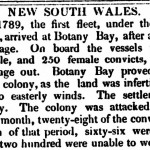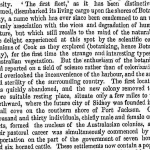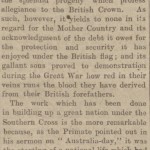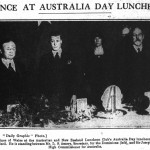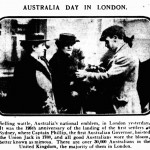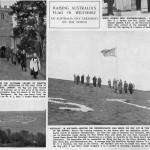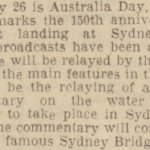On 26 January 1788, the First Fleet arrived in New South Wales, which saw the flag of Great Britain raised at Sydney Cove and the settlement of the first penal colony. The arrival also marked Britain’s proclamation of sovereignty over Australia’s eastern seaboard. This day has since become a national holiday in Australia: Australia Day. To mark this day, we’ve taken a look into its history and evolution.
You can find articles on this historic landing of the First Fleet in The British Newspaper Archive.
Records of celebrations regarding the 26 January can be found as early as 1808. Before the formation of the Commonwealth of Australia in 1901, celebration of 26 January was largely confined to New South Wales. The other colonies each celebrated their own ‘founding day’: South Australia’s Proclamation Day on 28 December, Tasmania’s Regatta Day marking the arrival of Abel Tasman, and Western Australia’s Foundation Day on 1 June, to name a few.
You can see mention of Foundation Day being celebrated in Western Australia from this article in the St James’s Gazette from 2 June 1899.

The widespread adoption of the term ‘Australia Day’ and its celebration did not occur until 1935, thirty-four years after the colonies federated.
Australia Day celebrations have often made headlines over the years. You can see some of the crowds and royal guests in the snippets below from celebrations both at home and abroad.
On the water
One tradition that has lasted over 100 years is the Australia Day regatta. It was first introduced into the day’s festivities in 1837 on Sydney Harbour. The newspapers have captured snapshots of the regatta over the years. Here is one photograph printed in The Sphere on 15 February 1958.

If you are interested in sports and reading historical sports news, check out some of The British Newspaper Archive’s sports-related titles.
A day of controversy
Similar to Columbus Day in the United States, Australia Day is no stranger to opposition. There are groups who have dubbed the day as ‘Invasion Day’ or ‘Survival Day’ as it marked the invasion of Indigenous Australians’ lands by Europeans. Despite the inclusion of some Indigenous Australian events in the celebrations of Australia Day, there are still protests to this anniversary being celebrated as a national holiday. These groups have advocated for the national anniversary to mark, instead, a day related to the founding of the Commonwealth, for example 1 January as it’s the anniversary of the Federation of Australia.
As with other European colonies, racism played no small role in the development of early Australia. The British colony was only interested in increasing the white English population and in deterring any others from moving in on what they saw as their territory. With such a history, celebrating the day of the British arrival – despite the country that eventually formed out of it – is fraught with uneasiness and anger. The English-centric mentality was not short-lived, continuing into the twentieth century; it is illustrated glaringly in this article from 1925.


As historians or genealogists it is important to view events and historical figures in the context of their time; this includes looking at uncomfortable cultural norms and ideologies on ocassion. Despite the difficulty in confronting such things as historical racism and prejudice, understanding the past enables researchers to understand not only their chosen subject of study but also present-day societal attitudes and development.


